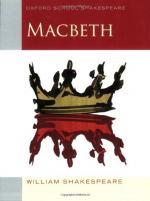|
This section contains 4,381 words (approx. 15 pages at 300 words per page) |

|
SOURCE: "Fear in Macbeth," in Essays in Criticism, Vol. XXII, No. 2, April, 1973, pp. 154-66.
In the following essay, Moorthy identifies fear as the thematic core of Macbeth, pervading the atmosphere and guiding the actions of Macbeth and Lady Macbeth.
The ambiguity of Macbeth's character is likely to be perpetuated as long as we identify the imaginative truth of the play with its moral faith. The play is, in an important way, more than its preoccupation with good and evil; its imaginative complex extends beyond its moral intention. There has been a certain romanticising of evil in Macbeth criticism. In calling the play 'a statement of evil'1—'Macbeth defines a particular kind of evil—the evil that results from a lust for power'2—L. C. Knights has made it morally central and, in doing so, abridged the work's imaginative scope and freedom. This approach has led to the diminution...
|
This section contains 4,381 words (approx. 15 pages at 300 words per page) |

|


